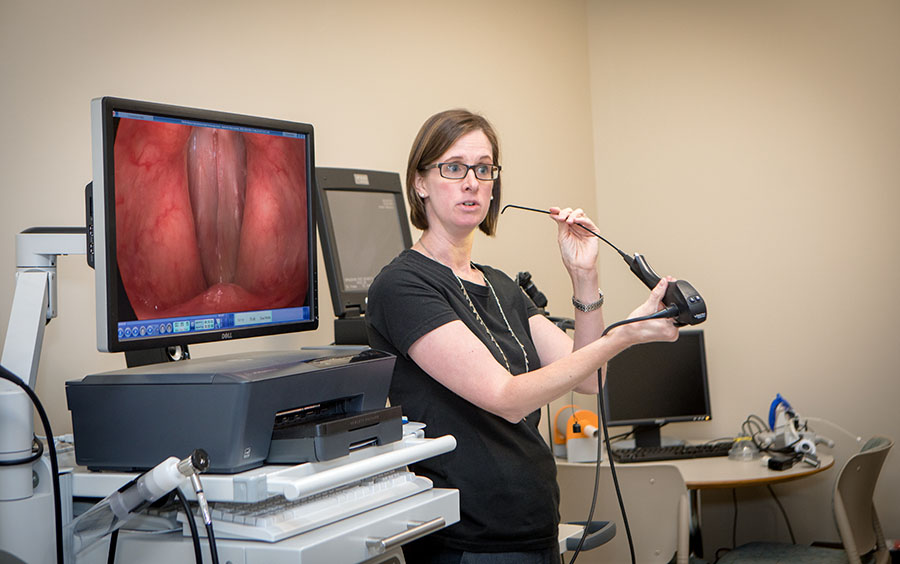BOONE, N.C. — To make a proper diagnosis, speech-language pathologist Dr. Jordan Hazelwood may ask her patients to sing.
She also will likely collaborate with a music therapist, nutritionist or other health professional to develop an effective treatment plan that takes into account all aspects of a patient’s work, school and family life.
“I hope to share the same clinical framework with my students — to treat the whole patient and understand that each health professional brings a unique set of skills to the table. Therefore, we have to work together as a team to be successful in increasing health and quality of life,” said Hazelwood, an assistant professor in Appalachian State University’s Department of Communication Sciences and Disorders.
She ensures such teamwork is among the clinical skills students gain in the department’s communication sciences and disorders undergraduate program and speech-language pathology graduate program, both of which became more medically focused after joining the Beaver College of Health Sciences in 2010.
“Appalachian State University makes great comprehensive clinicians,” Hazelwood said. “We train our students to achieve specialization and we prepare them by providing the most important aspects of our health-related discipline — education and clinical practice.”
Toward that end, Hazelwood said she’s excited about the expanding Voice and Swallowing Clinical Research Lab, part of the Blue Cross North Carolina Institute for Health and Human Services located in Appalachian’s Leon Levine Hall of Health Sciences.
For students, the lab offers clinical diagnostic hours and opportunities for collaborative research. For patient referrals, it offers specialized equipment that allows for direct visualization of the larynx during voicing and swallowing.
Such possibilities brought Hazelwood to Appalachian in 2017. “I wanted to be a part of growing the clinical capabilities. As an educator, being able to provide this level of care to our community is so rewarding,” she said.
A dedication to interdisciplinary practice and education
Hazelwood is a Board Recognized Specialist in swallowing and swallowing disorders and has completed fellowships in clinical research ethics and interprofessional education. She serves as the professional development manager for the American Speech-Language-Hearing Association’s Swallowing and Swallowing Disorders Special Interest Group.
As an expert in assessing and treating voice and swallowing disorders, she brings evidence-based research and clinical knowledge to students and clinical educators at Watauga Medical Center and the Foley Center at Chestnut Ridge.
Her dedication for interdisciplinary practice and education led her to pursue a doctoral degree in health and rehabilitation science. During her training, she worked with exercise scientists, public health scientists, occupational therapists and epidemiologists. The experience helped her realize she could provide better instruction to students by teaching how to effectively collaborate.
“Speech-language pathologists (SLPs) do their best work when collaborating with other health professionals,” she said.
For example, Hazelwood said, after evaluating a patient with complex swallowing difficulties, SLPs will consult with a nutritionist to discuss the best way for the patient to receive supplements or hydration until they can return to their usual eating and drinking. Social workers often help explain therapeutic goals to caregivers. Nurses and physician assistants provide medical information that helps the SLP determine a patient’s readiness for care, ability to participate in therapy and prognosis for recovery.
Well-respected and prepared
Hazelwood’s goal is to provide students with the education and training to achieve their maximum potential. Drawing on her clinical experience, she provides them with real-life examples of how patient care was helped or hurt by the interactions of health professionals. She encourages her students to seek out opportunities to observe and talk with clinicians from other disciplines to better understand how to strengthen collaborations for improved patient care.
“I want to ensure our students are well-respected and are prepared,” she said. “We also want to continue to grow our program’s reputation so that the clinical supervisors who are hosting our students want to have Appalachian students come back or, even better, hire our students.”
About the Beaver College of Health Sciences
Appalachian State University’s Beaver College of Health Sciences (BCHS), opened in 2010, is transforming the health and quality of life for the communities it serves through interprofessional collaboration and innovation in teaching, scholarship, service and clinical outreach. The college enrolls more than 3,600 students and offers 10 undergraduate degree programs, nine graduate degree programs and four certificates across seven departments: Kinesiology, Nursing, Nutrition and Health Care Management, Public Health, Recreation Management and Physical Education, Rehabilitation Sciences, and Social Work. The college’s academic programs are located in the Holmes Convocation Center on App State’s main campus and the Levine Hall of Health Sciences, a state-of-the-art, 203,000-square-foot facility that is the cornerstone of Boone’s Wellness District. In addition, the college supports the Appalachian Institute for Health and Wellness and has collaborative partnerships with the Wake Forest University School of Medicine’s Physician Assistant Program, UNC Health Appalachian and numerous other health agencies. Learn more at https://healthsciences.appstate.edu.
About the Appalachian Institute for Health and Wellness
The Appalachian Institute for Health and Wellness (App Well) connects Appalachian State University to the community by supporting health and wellness research, interprofessional clinics and community outreach programs. The institute partners with the community to better prepare students to become exceptional practitioners who will continue to address health issues and disparities throughout the region and beyond. Learn more at https://appwell.appstate.edu.
About Appalachian State University
As a premier public institution, Appalachian State University prepares students to lead purposeful lives. App State is one of 17 campuses in the University of North Carolina System, with a national reputation for innovative teaching and opening access to a high-quality, cost-effective education. The university enrolls more than 21,000 students, has a low student-to-faculty ratio and offers more than 150 undergraduate and 80 graduate majors at its Boone and Hickory campuses and through App State Online. Learn more at https://www.appstate.edu.
What do you think?
Share your feedback on this story.




![How NCInnovation Is Rethinking Economic Development in North Carolina [faculty featured]](/_images/_posts/2026/02/rethinking-economic-development-600x400.jpg)







